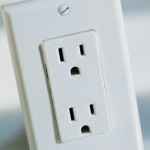Brush Up on the Basics of Your Electrical System
For anyone who’s not a trained electrician, the ins and outs of a home’s electrical system can be a bit of a mystery. Most people have a basic understanding of how electricity works in their homes and an even better understanding of how much that electricity costs, but beyond that, it can be murky territory. So, while learning is in the air this August, there’s no better time to brush up on the home electrical basics. Read on for a crash course in electrical 101.
Outlet Ins and Outs
There are many types of outlets, but the most common ones are 15A, 120 volt, and GFCI outlets. The National Electrical Code requires GFCIs to be installed in most of the rooms in the house. This is because GFCI outlets are Ground Fault Circuit Interrupters. They measure the voltage in an outlet and trip (turn off the flow of electricity) if they sense an imbalance, which happens with a ground fault. It’s impossible to say how many lives these outlets have saved, but the number is likely incredible.
Homeowners can spot these outlets in bathrooms, kitchens, garages, and laundry rooms. They have two small buttons on their face that read “Test” and “Reset.”
Outdoor Electrical
While GFCI outlets are required in many rooms inside the house, they’re also necessary outside. Outdoor outlets should all be GFCIs, and they should have covers that help protect them from the weather. These perform the same function outside as inside, where a regular outlet may result in electric shock and injury should a ground fault occur.
But it’s not just outdoor outlets that have specific safety features. It’s also any outdoor lighting or wiring. Pool pumps and lights should be connected to a GFCI outlet or breaker. So should any patio ceiling fans or other exterior lighting fixtures.
Benefits of Hiring a Professional
Homeowners should look out for the telltale signs of electrical problems in their outlets. These signs include scorch marks, smells like burning plastic or ozone, and warm outlets or light switches. Outlets with broken faces should also be inspected for damage.
While basic electrical work on the home can be performed fairly easily with a bit of research, it’s important to err on the side of caution. Working with electricity can be extremely dangerous, and electrical shock can result in anything from a minor injury to death. This is why homeowners who aren’t sure what to do or think they need significant work done on their home’s electrical should call a professional electrician. It’s not only safer to involve a professional, but it can also prevent mistakes that could cost more money in the long term.
About Solaris Electric
The professionals at Solaris Electric have been serving Orlando, FL for over 10 years. They offer same-day service and honest, upfront pricing. They also provide a satisfaction guarantee and never leave a mess behind! Call now for electrical service!


























